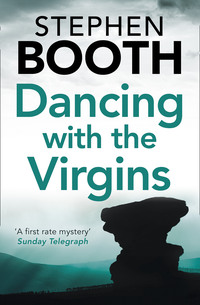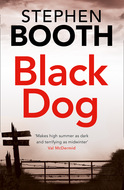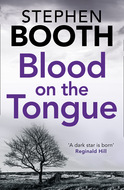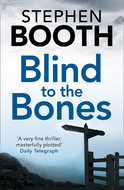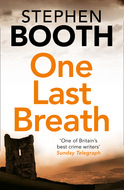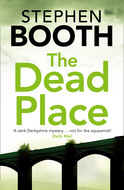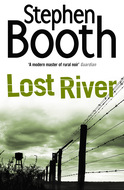Raamatut ei saa failina alla laadida, kuid seda saab lugeda meie rakenduses või veebis.
Loe raamatut: «Dancing With the Virgins»

DANCING WITH THE VIRGINS
STEPHEN BOOTH

Contents
Cover
Title Page
1
2
3
4
5
6
7
8
9
10
11
12
13
14
15
16
17
18
19
20
21
22
23
24
25
26
27
28
29
30
31
32
33
34
35
36
37
38
Acknowledgements
About the Author
Author’s Note
Praise
By the Same Author
Copyright
About the Publisher
Ancient sites in Derbyshire like the Nine Virgins stone circle are constantly under threat from vandalism, quarrying, erosion and abuse. They are also sacred sites, and are still actively used as places of worship. Please treat them with respect.
1
On the day the first woman died, Mark Roper had radio trouble. At the start of his shift, he had been patrolling in the valley, in the deep dead spot where the gritstone plateau blocked out the signal from the telephone interface point at Bradwell. The silence had been unnerving, even then. It had made him conscious of his isolation in the slowly dying landscape, and it had begun to undermine his confidence and stir up the old uncertainties. But Mark wasn’t frightened then. It was only later he had been frightened.
Normally, this was his favourite time of year – these few weeks of hesitation before the start of winter. He liked to watch the hills changing colour day by day, and the Peak District villages emptying of visitors. But he could tell that today wasn’t quite normal. There was a feeling about this particular Sunday that made him uncomfortable to be alone on Ringham Moor. There was something strained and uneasy in the way the trees stirred in the wind, in the way the dry bracken snapped underfoot and the birds fell silent in the middle of the afternoon.
As Mark climbed out of the dead spot, his horizon widened until he could see across to Hartington and the Staffordshire border. But even on his way back across the moor towards Partridge Cross, he could not raise his Area Ranger. Maybe the radio handset he had picked up from the briefing centre that morning was the one with the faulty battery connection. Little things like that could change your life forever.
‘Peakland Partridge Three to Peakland Zulu. Owen?’
No matter how many times he tried, his call sign went unanswered.
Earlier in the year, they had been burning the heather on this part of Ringham Moor. An acrid charcoal smell still clung to the vegetation, and it mingled with the sweet, fruity scent of the living flowers as it rose from the ground under Mark’s boots. In places, the stems had been left bare and white where the bark had been burned off completely. They showed up in the blackened carpet like tiny bones, like a thousand skeletal fingers poking from the earth.
Mark’s father had helped the gamekeepers many times with the swaling, the annual burning of the heather to encourage the growth of fresh shoots for red grouse to feed on. Conditions for burning had to be just right – the heather dry, but the ground wet enough to prevent the fire spreading down into the peat. You could get so hot controlling the flames that you thought your skin would be burned to a cinder, and if you were standing in the wrong place when the wind blew, you could end up black from head to toe. Sometimes, Mark recalled, his father had smelled like Bonfire Night for days.
The scent of the burned heather brought the presence of his father back to him now. It was a sensation so powerful that the tall figure might have been striding alongside him, swinging his huge, reddened hands, talking of working dogs and trout flies, and promising that he would take Mark and his brother on a shoot one day. But he had never carried out his promise. And he hadn’t walked with Mark again, not for a long time now.
The impression left as quickly as it had come, leaving Mark clutching desperately at a memory, reaching for an image that dissipated like a wisp of smoke in the wind.
Fumbling at the radio, he tried again. ‘Peakland Zulu. Can you hear me, Owen? Owen?’ But still there was nothing.
As he climbed to the plateau, the weight of Mark’s rucksack gradually increased, chafing his skin through the fabric of his red fleece, pulling down his shoulders and pressing on the muscles in his back. Despite the chill, his neck was wet with sweat, and he shivered as he came over a rise and the wind grabbed at him. The shadows of clouds were moving across the landscape below him. Brief patches of sunlight revealed a field dotted with sheep, a narrow stretch of tarmac road, an oak spinney, or the roof of a distant farmhouse. Yet the sight of human habitation only heightened his sense of being alone.
It was the environment, not the welfare of people and property, that had led Mark to volunteer as a Peak Park Ranger in the first place. Once, he had wanted to save the entire world, but in the end he had settled for helping to protect one little bit of it. He had not imagined that he would be called on to tolerate the actions of people who destroyed and defiled the environment, people who had no respect for nature and the lives of animals. It was the most difficult thing he had to learn. Maybe even Owen Fox would never be able to teach him that.
One thing Owen had taught Mark was the importance of good communication; he had told him to stay in touch, always. But this early November day had been the wrong time for Mark to choose for his first solo patrol. Entirely the wrong day to be on his own.
‘This is Peakland Partridge Three. Owen? Owen? Where are you?’
And, of course, it had been the wrong day for Jenny Weston, too.
Jenny had been riding a yellow six-gear Dawes Kokomo. It had one-inch tyres, and a wire basket bolted over the rear wheel. It was hired from the Peak Cycle centre at Partridge Cross on a three-hour ticket, and Jenny had already ridden nearly five miles to reach the plateau of Ringham Moor.
The moor was littered with prehistoric burial mounds, cairns and stone circles, some so small or so ruined and overgrown that they were barely visible in the heather and bracken. It was not as well used as the moors to the south and west, Stanton and Harthill, but its tracks were more accessible to a mountain bike, its open spaces more solitary, its face that bit closer to the sky.
Ringham had become one of Jenny’s favourite places. There were many reasons that brought her back, needs and compulsions that had worn a track for her bike tyres right to the base of the Hammond Tower on Ringham Edge. She carried an impression in her mind of the view down into the valley from the tower – that steep plummet through the trees on to a litter of rocks at the bottom.
It had been a blustery day, with showers that blew across the hills in squalls, bludgeoning the birches and scattering dead leaves into the heather. There seemed to be little life on the moor. But at the bottom of the track, Jenny had passed a youth wearing a red woollen cap pulled low on his forehead, with large ears that stuck out like table-tennis bats. He had been walking very quickly towards the road, and had refused to raise his head to meet her eye as she passed. Jenny had pressed down harder on the pedals, seeking to gain distance from the youth, so that she over-exerted herself on the slope and had to stop further on, gasping from painful lungs as she looked back. The youth had gone, and there was no one else to be seen – only a fistful of jackdaws drifting against the face of one of the abandoned quarries, and a herd of cattle lying restlessly in a field on the slope below the Virgins.
Jenny had always believed she was safer on a bike. Two wheels and the extra speed gave her the confidence that she could get out of trouble, if she needed to. A woman on her own, in a place like Ringham Moor, ought to think about being careful.
To get to the top of the moor, Jenny had to dismount and wheel the Kokomo up the steepest part of the path. She knew she was almost there when she reached the twisted Heart Stone, twelve feet high, with iron hand and foot holds driven into its sides.
At the top, the sandy track was cycleable, as long as you avoided the exposed rocks in the middle. It crossed a plateau of dark heather and whinberry, with patches of rhododendron on the southern slopes. There were old quarries on two sides, and sharp crags and edges on the east and south, where the plateau fell away into the valleys.
The crossing of the main paths was marked by a wooden sign scrawled with the name of the Nine Virgins and a yellow arrow. Around the sign was an area worn by many feet. Someone living in the valley had a peacock; its long drawn-out shriek drifted across the moor before dying away in the wind.
By the time she reached the Virgins, Jenny could feel the perspiration standing out on her forehead. Her Lycra cycling shorts were tighter on her hips and buttocks than they should have been, and the skin of her legs was pink and blotched from the exertion and the chafing of the wind.
She didn’t mind the wind, or the cold, or even the exertion. Up here on the moor they helped to blow away the thoughts that would sit in the corners of her mind all the rest of the week, dark and evil-eyed. Nowhere else could she do that; certainly nowhere in Sheffield, where the crowded streets and the traffic only fed her anxieties.
In early November, the weather kept most people off the moor. But she could see that someone was sitting against the trunk of a tree near the stone circle, playing a few notes on a flute, toying with a tune that was vaguely familiar. She couldn’t see the musician clearly, but she had an impression of long, fair hair and a multi-coloured sweater.
Jenny turned the handlebars of the bike away from the Nine Virgins and headed towards a path that ran down through deep bracken. The path turned into a stream bed later in the winter, and the ground was scoured to its sandy bottom. Tree roots ran close to the surface, bursting through to form ragged steps in the steepest parts. Beechnuts crunched underfoot and the bracken was head high. It pressed close around her, its brown, dead hands brushing against her legs and rattling on the spokes of her wheels.
Beyond the dip, the Hammond Tower stood at the top of the slope. It was prominent on the horizon, tall and built of grey stone, but serving no apparent purpose. A walled-up doorway faced a flight of roughly cut steps and a steep drop off Ringham Edge. Fallen leaves filled a wide hollow between the tower and the rock outcrops they called the Cat Stones.
Jenny sat for a while on a broken ledge at the base of the tower, staring at the view across the dale, waiting for her breathing to slow down, but feeling the chill begin to creep over her skin. She shouldn’t stay long, or her muscles would stiffen.
Down in the valley, she could see the farm, with a field full of cows, a cluster of gritstone buildings and a bigger, newer shed with a dark green steel roof. A track ran past the farm, and she studied it carefully for figures walking by the gate and heading up towards the tower. But there was no one today.
As she stood up to retrieve her bike, she noticed a crevice in the stones of the tower which had been crammed with crumpled drinks cans and cigarette packets. Jenny shook her head in irritation, but did nothing about the litter. It was a job for the Rangers who patrolled the moor.
A few minutes later, she had reached the stone circle again. The Nine Virgins were only about four feet high, and they stood in a clearing of flattened and eroded grass between clumps of birch and oaks. Fifteen yards from the circle was a single stone on its own, an outlier – the stone that they called the Fiddler. According to the legend, nine village maidens had been caught dancing on the Sabbath and had been turned to stone for their sin. The fiddler who played for them had suffered the same fate. Now the single stone looked lonely and isolated, condemned for ever to stand outside the circle.
Jenny stopped the bike and wiped her palms on a tissue. The hills were already misting into grey over the banks of bracken, but the clouds broke and allowed a trickle of sun on to the moor. There was no sound but for the wind whispering across the heather. There was no one to be seen now; she was alone. And it was perfectly safe on a bike – as long as you didn’t get a puncture.
‘Oh, damn!’
She dismounted and struggled to turn her bike upside down to inspect the back tyre. Immediately she saw the glitter of a sliver of glass. It had slit a gaping wound in the rubber tread and gone straight through to puncture the inner tube. She pulled the glass free, flinching at the sharp edges, and listened to the last gasp of escaping air. The tyre looked peculiarly lifeless as it hung from the wheel, the soft grey skin of its collapsed tube protruding under the rim.
Jenny knew what a hassle it was to get the tyre off the back wheel, repair and replace it, and she was already reaching that state of tiredness where everything felt like a major task. But there was nothing else for it. Sighing, she flipped the quick-release lever and dropped the wheel on the ground. The forks of the bike pointed into the air in an undignified posture, like a dead animal on its back.
She was reminded of a photograph that had been taken at the height of the panic over mad cow disease. It had shown a slaughtered British Holstein cow, a huge animal with its stomach bloated, its vast udder shiny and leaking a dribble of milk, and its four stiff legs pointing ludicrously to the sky. The cow had been waiting its turn to be rolled into an incinerator. Its photograph had been on the front of leaflets that Jenny had helped to distribute, and she had seen it so many times that the details had stayed with her ever since, along with other images of things that had been done to animals.
Automatically, she patted the pouch she wore round her waist, to make sure it was still there. Soon, she would have to decide what to do with what it contained.
Jenny shivered. The weather had changed, and the evening would be cold. The feathery stems of cotton grass created patches of golden mist close to the ground. They hovered just above the heather, moving in the wind like live creatures stirring in their nests.
It was the noise of the wind in Jenny’s ears that covered the soft sound of footsteps until the walker was only a few feet behind her.
In half an hour, Mark was due to go off duty. Owen had given him exact instructions for his first solo patrol – a pass across the face of Ringham and a descent into the valley on the far side, where the moor turned into farmland. There he was to take a look at the walls and stiles and signposts for recent damage, and have a scout around for the worst of the litter left by hikers.
On the way back, he should have a glance at the Nine Virgins to see that the ancient monument was no more scarred than usual; have a word, perhaps, with any campers foolhardy enough to have pitched their tents in the woods. Mark couldn’t imagine why anybody would want to camp on the moor at any time of the year, let alone in November. But still they did it. And they were breaking the law when they did.
Near the top of the track he noticed a crumpled Coke can, dropped by some careless visitor. Muttering angrily, he picked it up and slipped it under the flap of his rucksack, where it joined a small pile of chocolate bar wrappers, aluminium ring-pulls and an empty Marlboro packet and some cigarette ends he had found near the Hammond Tower, to be disposed of later. Mark couldn’t tolerate the attitude that made people think it was OK to scatter the environment with litter. They thought their own convenience was more important.
If he had his way, Mark would ban these people completely from the national park. He would put tollgates on all the entrance roads and issue passes for admission. It might come to it one day, too. The park couldn’t cope with the constantly rising numbers.
There were tyre tracks in the sandy soil here. That meant there had been a mountain biker this way recently. Mark knew his by-laws; he had read the regulations carefully, and he knew what was allowed and what wasn’t. The Peak District National Park Authority had prosecuted mountain bikers before.
He smiled in satisfaction, then immediately felt guilty. Owen said the main skills you needed as a Ranger were tact and diplomacy. Why get into an argument when you could achieve more with a friendly word of advice? Mark knew he had a lot to learn. Sometimes he couldn’t find the right things to say to people who appalled him with their stupidity and their disregard for their own safety, the property of others – and, above all, for the environment and its wildlife. That was their greatest crime, these people who desecrated the moors. The last thing they deserved was diplomacy.
Though it was only two o’clock, it would be starting to go dark in a couple of hours’ time. For a few days now, Mark had noticed that peculiar half-light, like full moonlight, that came at five o’clock in the afternoon, when all the colours seemed to change and glow for a few minutes before fading into the darkness. The turning back of the clocks at the end of British Summer Time always worried the Peak Park Rangers. Walkers were liable to miscalculate and still be on the hills when it went dark.
The afternoon was turning cold, but Mark didn’t feel the chill. The red fleece jacket he wore proudly, with its silver Peak Park insignia, kept him warm. It was also a reassuring sight for the visitors a Ranger came across – those who were lost and bewildered, exhausted or injured, or simply inadequately dressed and too poorly equipped for walking the moors. The sight of the red jacket was like a friendly beacon. It meant a Ranger approaching.
Jenny Weston had been in the act of smiling when she died. Her smile had stiffened and shattered, twisting into a grin of fear as the knife slipped under her ribs.
The blade was sharp, tungsten coated, and with a lethal tip. It slit the cotton of her T-shirt and sliced easily through her skin and a layer of subcutaneous fat as it thrust towards her heart. A small patch on the front of her T-shirt turned red and a single spurt of blood splashed on to the handlebars of the Kokomo.
As soon as the knife was withdrawn, the wound closed and ceased to bleed on the outside. Jenny looked down, astonished, and pressed her hand to the red patch. Inside her ribcage, her heart sac was already filling with leaking blood; the pressure of it squeezed her heart and constricted its movement. Then her left lung deflated and a gush of fluids filled the cavity. She began to feel light-headed; her hands and feet turned numb, and her legs lost the strength to hold her body upright.
She made no resistance as she was grasped under the armpits and dragged across the clearing, with her heels leaving trails in the sandy soil. As fresh blood failed to reach her brain and extremities, her skin turned a dirty white; her legs and belly looked like lumps of boiled fish as they were deliberately exposed to the light.
The blade of the knife left a red smear where it was wiped on the grass. From the handlebars of the bike, a small trickle of blood had run down on to the front wheel. It dripped slowly from spoke to spoke, already darkening and thickening in the air, until it was absorbed into the ground.
By the time her attacker had finished, or not long after, Jenny Weston was dead.
Mark knew it happened sometimes, but it was such a pointless thing to do. Mindless and irresponsible. Now and then the Ranger briefings mentioned a bike that had not been returned to the hire centre. Hirers had to give proof of their identity and leave a name and address, as well as a £20 deposit, so it was hardly worth trying to get away with a mountain bike, considering how easily you would get caught. But sometimes there was one who took the bike away with them. Occasionally, they simply abandoned it on one of the tracks, in a car park, or up here on the moor, like this one. None of it ever made sense to Mark.
The sight of the Kokomo under the gorse bush angered him unreasonably. Its presence was like a violation – the evidence of selfish humanity intruding into his world, like children pawing his most precious possessions with grubby fingers. The bike had been treated as just so much rubbish.
Then Mark looked more closely. A streak of red had stained the canary yellow paintwork of the front stem and left rust-like spots on the spokes. He shivered with misgiving and fingered the radio in his pocket. Suddenly he wished he hadn’t come out alone, after all. There was no reassuring presence alongside him, no Owen there to know exactly what to do.
With a shaking hand, Mark made a note of the colour, model and number of the bike, crumpling the pages of his notebook in his haste to get it out of his pocket. The act of writing made him feel better, more in control, as if the ink marks on the page had magically brought a familiar voice from the air: ‘Observe, keep a note, report back.’
‘Yes, Owen,’ whispered Mark.
Feeling the sweat drying on his forehead and the back of his neck, he forced himself to walk past the bike to where the stones were clustered among the spindly birches. Somebody had lit a fire here recently, leaving scorched earth and a pile of white ash. People were always lighting fires near the Virgins, as if they thought the flames might melt their stony hearts. At the midsummer solstice, there were hundreds of folk up here at night, and they did a lot more than light fires.
Mark stopped abruptly as he looked into the circle. The sensations that came reminded him of the terrors of his puberty, the physical sickness and the guilt. He tried to concentrate on studying the ground, to look for evidence of bike tracks or footprints. He tried to think about casting around for telltale objects that might have been dropped by someone who had been in the area. I’m observing, he told himself. I must observe. Be professional and calm, and don’t rush into anything.
But he couldn’t keep up the pretence for long. His eyes just wouldn’t focus on anything else. With shameful fascination, Mark found his attention drawn to the centre of the stone circle, where the white shape lay in such startling, rousing incongruity.
‘Oh, Jesus.’
The body of the woman sprawled obscenely among the stones. Her half-naked torso had been flung on the rough grass, her arms and legs twisted in provocative gestures. Her right knee was lifted high, to the level of her waist, and her left leg was stretched taut, as if she might be about to spring into the air.
Mark could see every detail of the muscles in her legs, the tendons rigid under the skin at the top of her thigh, the faint crinkling of cellulite on her hips. Her pose was a caricature of life, a cruel parody of flamboyance and movement. Her hands were tilted at the wrist, her toes pointed downwards, and her head nodded to silent music. She was spread against the ground in a final arabesque, in a fatal pirouette, or the last fling of an abandoned tango.
Mark wondered whether to write it down. But it sounded too strange, and his hand wouldn’t write any more, anyway. Instead, he repeated it to himself, over and over, in his head. A dead woman dancing. She looked like a dead woman, dancing.
